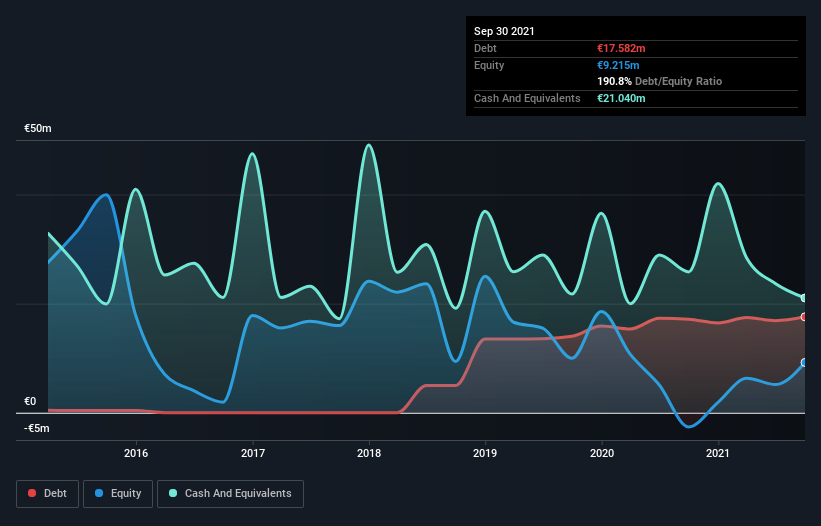David Iben put it well when he said, 'Volatility is not a risk we care about. What we care about is avoiding the permanent loss of capital.' When we think about how risky a company is, we always like to look at its use of debt, since debt overload can lead to ruin. Importantly, Gigaset AG (ETR:GGS) does carry debt. But is this debt a concern to shareholders?
What Risk Does Debt Bring?
Generally speaking, debt only becomes a real problem when a company can't easily pay it off, either by raising capital or with its own cash flow. Part and parcel of capitalism is the process of 'creative destruction' where failed businesses are mercilessly liquidated by their bankers. While that is not too common, we often do see indebted companies permanently diluting shareholders because lenders force them to raise capital at a distressed price. Of course, the upside of debt is that it often represents cheap capital, especially when it replaces dilution in a company with the ability to reinvest at high rates of return. When we examine debt levels, we first consider both cash and debt levels, together.
Check out our latest analysis for Gigaset
What Is Gigaset's Debt?
As you can see below, Gigaset had €17.6m of debt, at September 2021, which is about the same as the year before. You can click the chart for greater detail. However, it does have €21.0m in cash offsetting this, leading to net cash of €3.46m.

How Healthy Is Gigaset's Balance Sheet?
We can see from the most recent balance sheet that Gigaset had liabilities of €75.5m falling due within a year, and liabilities of €103.8m due beyond that. Offsetting this, it had €21.0m in cash and €23.2m in receivables that were due within 12 months. So its liabilities total €135.0m more than the combination of its cash and short-term receivables.
This deficit casts a shadow over the €37.1m company, like a colossus towering over mere mortals. So we definitely think shareholders need to watch this one closely. After all, Gigaset would likely require a major re-capitalisation if it had to pay its creditors today. Gigaset boasts net cash, so it's fair to say it does not have a heavy debt load, even if it does have very significant liabilities, in total.
We also note that Gigaset improved its EBIT from a last year's loss to a positive €2.5m. The balance sheet is clearly the area to focus on when you are analysing debt. But it is future earnings, more than anything, that will determine Gigaset's ability to maintain a healthy balance sheet going forward. So if you want to see what the professionals think, you might find this free report on analyst profit forecasts to be interesting.
Finally, a business needs free cash flow to pay off debt; accounting profits just don't cut it. While Gigaset has net cash on its balance sheet, it's still worth taking a look at its ability to convert earnings before interest and tax (EBIT) to free cash flow, to help us understand how quickly it is building (or eroding) that cash balance. Over the last year, Gigaset saw substantial negative free cash flow, in total. While that may be a result of expenditure for growth, it does make the debt far more risky.
Summing up
While Gigaset does have more liabilities than liquid assets, it also has net cash of €3.46m. However, we do find both Gigaset's level of total liabilities and its conversion of EBIT to free cash flow troubling. So even though it has net cash, we do think the business has some risks worth watching. When analysing debt levels, the balance sheet is the obvious place to start. However, not all investment risk resides within the balance sheet - far from it. These risks can be hard to spot. Every company has them, and we've spotted 1 warning sign for Gigaset you should know about.
Of course, if you're the type of investor who prefers buying stocks without the burden of debt, then don't hesitate to discover our exclusive list of net cash growth stocks, today.
New: Manage All Your Stock Portfolios in One Place
We've created the ultimate portfolio companion for stock investors, and it's free.
• Connect an unlimited number of Portfolios and see your total in one currency
• Be alerted to new Warning Signs or Risks via email or mobile
• Track the Fair Value of your stocks
Have feedback on this article? Concerned about the content? Get in touch with us directly. Alternatively, email editorial-team (at) simplywallst.com.
This article by Simply Wall St is general in nature. We provide commentary based on historical data and analyst forecasts only using an unbiased methodology and our articles are not intended to be financial advice. It does not constitute a recommendation to buy or sell any stock, and does not take account of your objectives, or your financial situation. We aim to bring you long-term focused analysis driven by fundamental data. Note that our analysis may not factor in the latest price-sensitive company announcements or qualitative material. Simply Wall St has no position in any stocks mentioned.
About XTRA:GGS
Gigaset
Operates in the area of telecommunications in Germany, Europe, and internationally.
Reasonable growth potential and fair value.
Market Insights
Community Narratives



